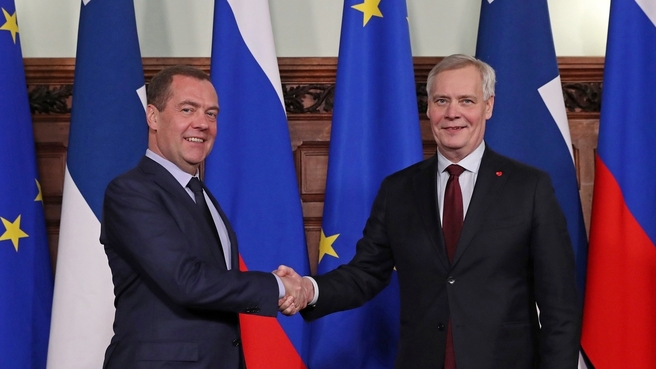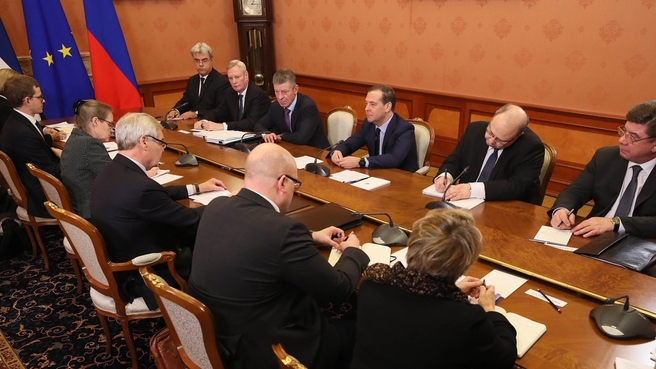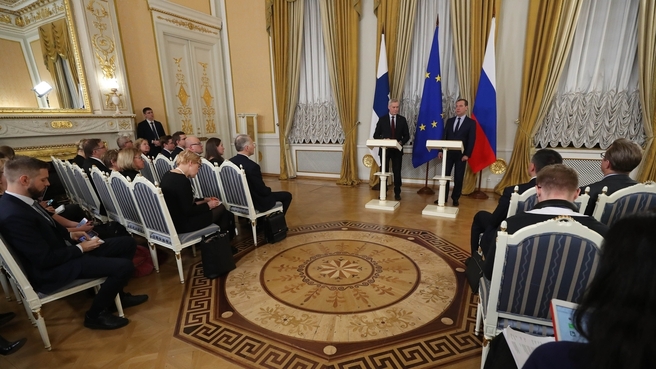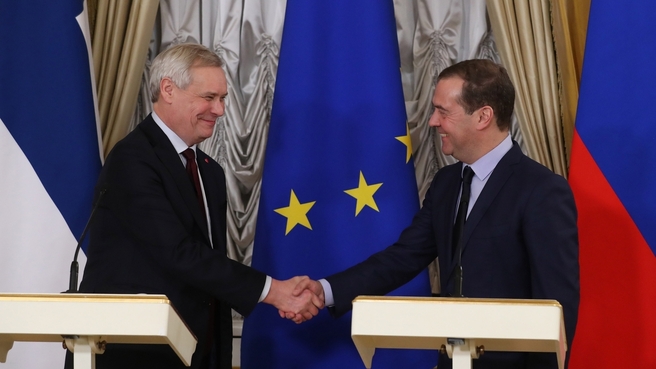Dmitry Medvedev held talks with Prime Minister of the Republic of Finland Antti Rinne.
Talks between Dmitry Medvedev and Prime Minister of the Republic of Finland Antti Rinne
A news conference on Russian-Finnish talks
Dmitry Medvedev: Mr Prime Minister, I would like to extend warm greetings to you.
This is your first visit to Russia in your role as Prime Minister, although we have already talked by telephone. But of course, I wish you every success during your visit to Russia.
We cooperated in an effective and constructive manner with your predecessor in the post. I believe you and I will also cooperate in this manner. Finland is our good neighbour and partner, so we are looking forward to further developing relations with your country.
Antti Rinne (via interpreter): Thank you very much, Mr Prime Minister. Thank you for your invitation to visit Moscow. I am pleased that we have the opportunity to meet, despite your busy schedule. Our bilateral agenda gives no reason for concern. Our contacts are effective and work is proceeding smoothly. We also maintain relations at the regional level, and I have noted that there is also effective cooperation between individual cities in our countries.
It is very important that good neighbours also have people-to-people ties. I must say that there are more tourists from Russia visiting Finland than from any other country. Our diplomatic missions in the Russian Federation issued 25 percent more visas than last year. Of course, this is good for tourism.
When we get down to work, I suggest we discuss bilateral issues, like cooperation on environmental and forest management issues – definitely, we will talk about this. I would also like to discuss relations between Russia and the European Union, security in the Baltic Sea area, Ukraine and the Council of Europe.
Dmitry Medvedev: We will certainly discuss all these issues.
A news conference on Russian-Finnish talks
Dmitry Medvedev: Mr Prime Minister, ladies and gentlemen, members of the media,
In-depth talks were held with my Finnish colleague Antti Rinne.
This was the first time we met, although we have talked on the telephone. Of course, a one-on-one dialogue is always important as it allows you to promptly discuss important issues and conflicts, if any, and also opens up the opportunity for new and promising projects, particularly, if the discussion is frank, as it was in our case.
Finland is an important partner for us and our close neighbour, and this is permanent. We must do everything we can to allow these relations to develop successfully.
Overall, we are satisfied with the current trade numbers and economic and investment relations. In 2018, trade reached almost $15 billion, up 20 percent on 2017, which is not bad. We have seen better numbers, almost $22.5 billion in 2008. This is something we can achieve if we apply ourselves. Major projects are always good for trade numbers. The completion of an important phase in the construction of the Nord Stream 2 gas pipeline was a major contribution. Finnish companies and two ports participated in the pipe-laying.
Investment is equally important. According to analysts in both our countries, Finnish investment in Russia reached 14 billion euros. As the prime minister said during the expanded format of talks, this is the world’s largest per capita investment. This is probably so. I immediately started dividing $100 billion-plus into the Chinese population number and saw that it was clearly less.
There are top-performing companies and there are active investors, especially in the energy sector such as Fortum Energy Concern which has already invested $5 billion. The geography and areas of investment are vast. This investment is good and important, and we appreciate it.
We covered important matters like environmental protection cooperation in the Baltic Sea - truly our common asset, which we must take care of. In particular, we discussed cooperation in an area that is important for us, namely, municipal solid waste disposal. Finland has much expertise in this area. We believe cooperation in this area will be even more engaged and multifaceted. In fact, it has already started in specific projects.
Cooperation the humanitarian area, in culture and tourism is also important for our countries. Much has been done to promote tourism. As you may recall, about 950,000 Finnish tourists came to Russia and 3.4 million tourists from Russia to Finland in 2018. This is indicative of the potential of tourist volumes. Checkpoints are critical for promoting tourism, as are simplified entry documents, including electronic visas. All of that, including additional crossing points and new forms of visa documentation, are already operational. So, I am confident that this cooperation will only get stronger.
We discussed not only domestic matters, but the international agenda as well. We covered the situation in Europe and relations between Russia and the EU, especially so since Finland is currently chairing the Council of Europe. We discussed a number of regional problems and relations with Ukraine, as well as settling the situation there. Of course, we talked about our contacts and ways to cooperate in the Arctic, which is an important region of the planet. This is yet another area of our interaction with Finland.
So, the list of issues was long, but we will probably never run out of things to discuss in the future.
That almost covers the things we did. Now, I give the floor to the Prime Minister of Finland.
Antti Rinne (via interpreter): Mr Medvedev, Messrs listeners, my colleague, Prime Minister Dmitry Medvedev, and I have held sincere and constructive talks on bilateral issues as well as environmental, climate and economic matters. We also talked about relations between the European Union and the Russian Federation and the international situation.
Our countries maintain very close contacts at the grassroots level, as well as between our regions and cities. Russians are the largest group of foreign tourists in Finland. The number of visas issued by Finland to Russians and the number of crossings at our common border is growing. We are confident that Russia’s new e-visas will also help increase the number of trips to Russia by Finns. Cooperation between our citizens and regions plays an important role in relations between our countries.
Mr Medvedev and I spoke at length about climate and environmental issues. These are the issues on which we should cooperate very closely as neighbours. We also addressed our countries’ commitments under the Paris Climate Agreement and the specific events it provides for.
I also invited Russia to take part in the climate coalition of finance ministers. This idea was initiated by the Finnish Finance Minister, among others.
Projects on reducing the emissions of soot (or black carbon) have been launched in the Russian Arctic. This is a specific measure on protecting the climate.
One of the goals of my Government is to invest resources into protecting the Baltic Sea. We plan a summit devoted to the condition of the sea with the express purpose of raising additional funds for these activities.
Environmental protection is an area where we can achieve a lot if we work together.
As Mr Medvedev has already mentioned, we discussed trade and economic relations between our countries. He said Finland was the biggest per capita investor in Russia.
We discussed the development of the business environment. Russia is a very important market for many Finnish companies. Finnish firms have much to offer in waste management, considering the reform that Russia is carrying out now. This concerns treatment of industrial waste and sewage waters.
Finland has the latest experience in treating waste and reforming this industry because only 10 years ago we were dumping almost half of all solid waste in landfills. Today, this is only about 1 percent.
We also reviewed issues related to cooperation in the forestry sector. We would like to pay special attention to the sustainability of forestry in maintaining cooperation. Since we are neighbors, highly functional relations and cooperation between our border services are vital for us. Such cooperation becomes even more important during emergencies, such as forest fires.
Regarding international issues, we talked about the situation in Ukraine. The conflict in Ukraine brings tensions into EU-Russia relations. Further development of these relations and normalisation directly depend on the settlement of this conflict and the central role in this belongs to Russia.
During our conversation, I said we were content with Russia’s continued membership in the Council of Europe. This is very important for the legal protection of citizens. Naturally, membership in this organisation means being committed to and acting in conformity with common principles and obligations.
In this context, we discussed urgent human rights issues. During our conversation, I expressed concern over certain aspects of human rights observance.
In the framework of its EU Presidency, Finland will hold, at the end of this week, a high-level event, “A Clean and Global North,” that will also be devoted to the 20th anniversary of the Northern Dimension. I am very glad that this event will be attended by a senior Russian representative.
Interaction between our regions and border areas plays an important role in cooperation between Finland and Russia and between the EU and Russia.
In conclusion, I would like to once again thank my colleague for an open and constructive conversation.
Thank you.
Question: Good afternoon, I have a question for the Prime Minister of Finland, the country that currently presides over the Council of the EU. The Normandy Four summit is fast approaching. If it is a success, is it possible that the EU softens its sanctions on Russia?
A follow-up to the question for you, Mr Medvedev. Clearly, we did not impose the sanctions – you have repeatedly mentioned this – but we have imposed counter-sanctions. Can we lift them before the original sanctions are lifted?
I also have a general question about our relations. Is it better for Russia to build relations with the EU as a whole or with each EU member state on a bilateral basis?
Antti Rinne (via interpreter): Thank you for the question. We welcome any process that may lead to resolving this conflict and the issues associated with it.
So, we welcome the Normandy format meeting and hope that progress will be made at this meeting, which will help implement the commitments and the provisions under the Minsk Agreements which, in turn, is a prerequisite for lifting the sanctions. As an EU member Finland adheres to EU policy, positions and sanctions.
Dmitry Medvedev: What can I say? Regarding Russia taking the first steps and lifting our retaliatory restrictive measures, the answer is clear, and you, in fact, framed your question with this answer in mind. Of course, we will not lift the restrictions.
It’s true that the sanctions are not pretty. Our retaliatory measures are not pleasant for many, but not all. A number of Russian companies want our retaliatory measures to remain in place forever. Let’s wait and see. If there’s progress, primarily, in Ukraine as it resolves its domestic conflict, our relations with the EU, which made Russia-EU relations dependent on the situation in Ukraine, might improve. If there’s no progress, then these sanctions will last a long time. Our counter-sanctions will be there for a long time as well, but we can still live and grow under these circumstances. So, answering the second part of the question, yes bilateral relations with individual EU countries are much more important for us now than relations with the EU in general.
Question: A question to both prime ministers.
Do you think that during the past year relations between the Russian Federation and the European Union have become somewhat warmer? At any rate, Russia has expressed certain hope and wishes for this. Is there any way this process can be facilitated through the studies of Stalin’s reprisals and their victims? I am referring to the opinion of Russian citizens and in the broader context of relations between Russia and the EU.
Dmitry Medvedev: This is probably a question for a political discussion rather than for the two prime ministers. I can still try to say a few words on this subject. First, as I said: We want normal relations with the EU but we will not do anything before the EU wants to restore them itself.
Brussels has hurt these relations so the EU, not us, should now ask for a restoration. They have new leaders and the ball is in their court. We have not severed any contact.
As for history, it is always very complicated, and sometimes tragic; I think we should look forward rather than back in order to develop relations. Your question is hardly relevant to the current agenda of relations between the EU and Russia, or Finland and Russia.
Antti Rinne (via interpreter): I think we do not have a common opinion, a common position or understanding on how the current situation came into being and what determined it. I must say that settlement on the issue of Ukraine plays a central role in this respect. We must focus on this.
I see positive signs, positive moments in this respect but this is just the beginning of the road. We will likely have to cover a long distance. For the time being we should derive satisfaction from the fact that this situation remains open, outstanding. Probably, it can remain in this status for a fairly long period of time.
As for the victims of Stalin’s reprisals, I must say that Finnish scholars have studied some serious, painful moments of our history. They were subjected to intense academic scrutiny. Take the events of 1918. I would like to emphasise that this was scholarly research. In Finland, research is never used for political ends.
If such research is conducted, if scholars and researchers cooperate, we will welcome this. But, let me repeat that this should only be confined to research, not to political influence or attempts to use it like that. Finland has a very clear and unequivocal position on this issue.
















